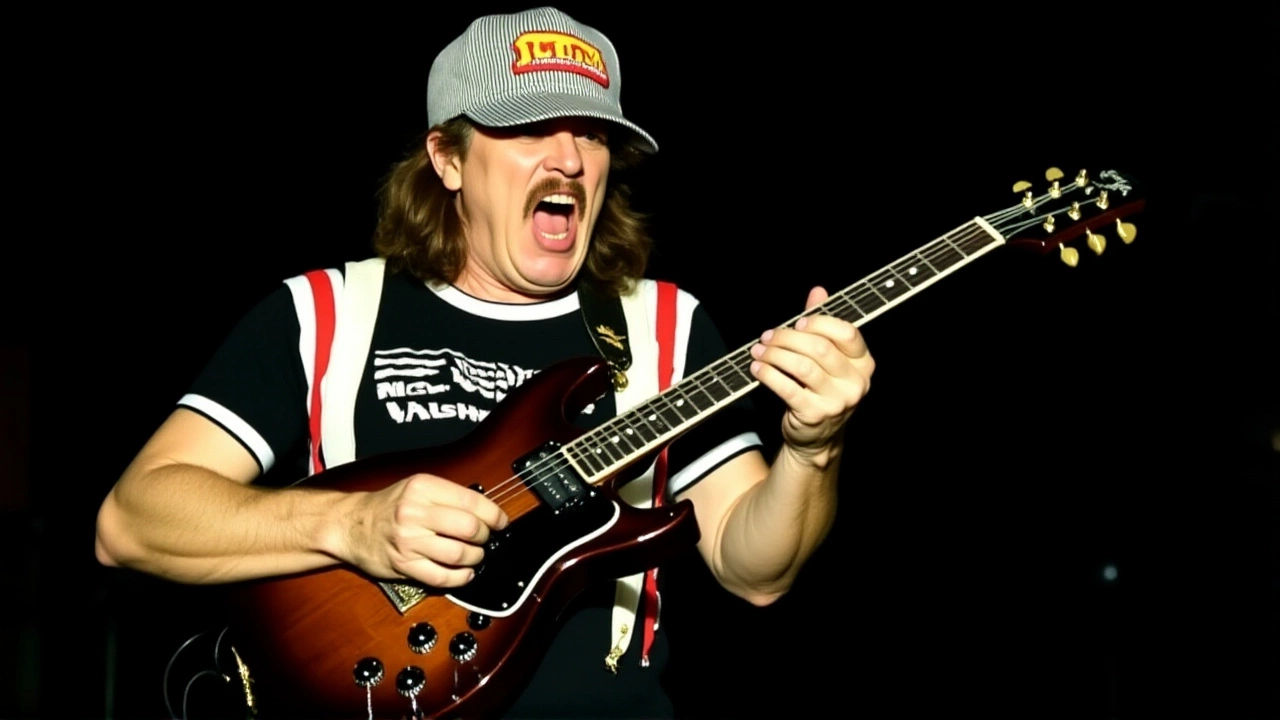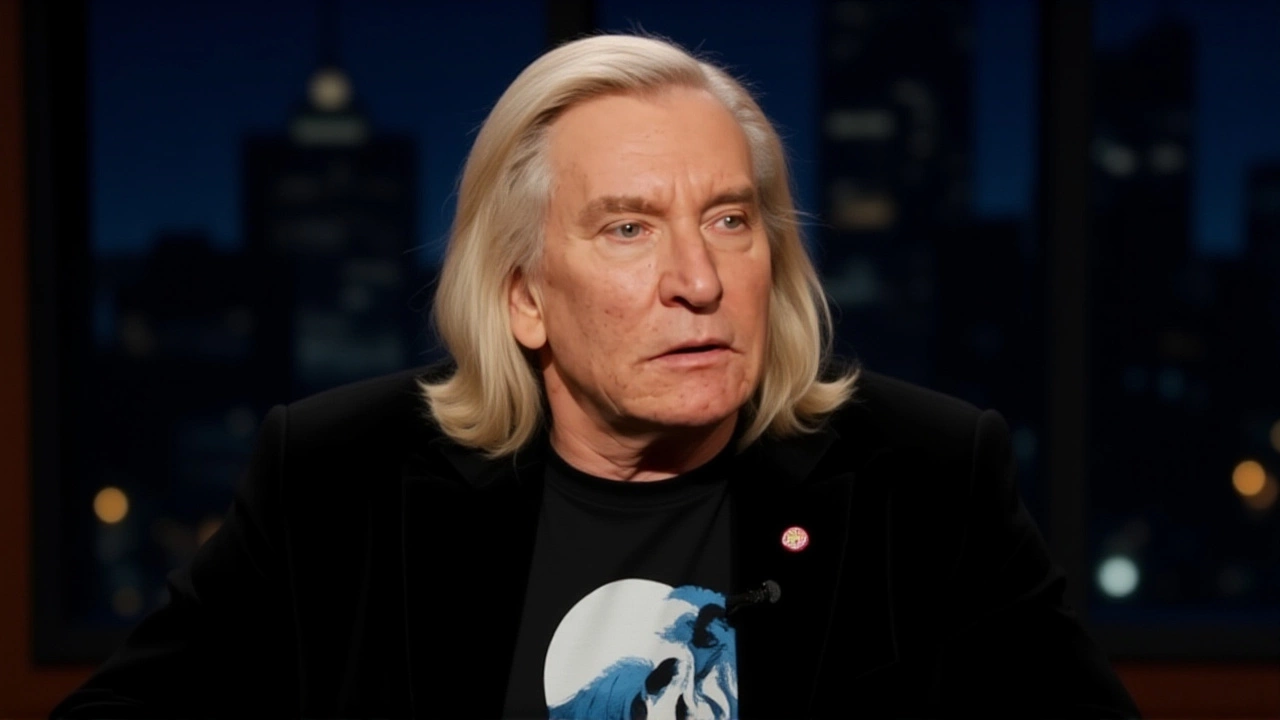
At 77, Joe Walsh isn’t just a rock legend—he’s still listening. In October 2025, the Joe Walsh, longtime guitarist for the Eagles, dropped a surprise endorsement that sent ripples through music circles: among all the bands emerging in the last 20 years, he only truly connects with three—The Black Keys, Kings of Leon, and Gorillaz.
"And there's a band called Gorillaz and I happened across them and I think they're great," Walsh told an unidentified interviewer, according to Far Out Magazine’s October 2025 feature. That quote, simple and unpolished, carried weight. It wasn’t a PR stunt. Not a nod to trendiness. It was the quiet approval of a man who’s heard it all—from the raw blues of Muddy Waters to the studio wizardry of Brian Eno—and still gets surprised.
Why This Matters More Than You Think
Walsh didn’t just stumble into rock stardom—he helped define it. As the lead guitarist for the Eagles since 1975, he played on Hotel California, The Long Run, and Long Road Out of Eden. He’s a five-time Grammy winner, Rock and Roll Hall of Famer, and ranked No. 54 on Rolling Stone’s 2011 list of the 100 Greatest Guitarists of All Time. His solo hit "Rocky Mountain Way" still blares from classic rock stations. His tone? Gritty. Unfiltered. Alive.
So when he says "they’re right on it," it’s not just praise—it’s a signal. He’s not talking about polished pop or auto-tuned vocals. He’s talking about bands that still feel dangerous. That still have something to prove.
The Three Bands That Won Him Over
Let’s break them down—not because Walsh did, but because we should.
The Black Keys brought back garage rock’s dirt and soul, stripping away the gloss of 2000s radio rock. Their 2010 album Brothers—with its howling vocals and slide guitar—felt like a middle finger to overproduced pop. Walsh, who once said he admired the Rolling Stones for their "raw untamed energy," likely heard the same spirit in Dan Auerbach’s distorted riffs.
Kings of Leon? They were the Southern rock revivalists who mixed gospel grit with stadium-sized hooks. Their 2008 album Because of the Times had a bluesy swagger that even old-schoolers like Walsh could respect. Not flashy. Not trendy. Just honest.
And then there’s Gorillaz. The virtual band. The cartoon project. The genre-bending experiment led by Damon Albarn and Jamie Hewlett. Walsh didn’t just like them—he called them "a brave new world." That’s telling. He’s spent decades playing real instruments with real people. But Gorillaz? They used sampling, hip-hop beats, electronic textures, and guest vocalists from every corner of the globe. And yet, somehow, they kept the soul. That’s what hooked him.

What He Doesn’t Like—And Why
Walsh doesn’t mince words about what turns him off. In a March 2025 interview with Guitar Player, he said he’s tired of "perfect" music. "I don’t need another guy playing 16th notes at 180 BPM," he said. "I need someone who sounds like they’re about to fall off the stage—and still hitting the right chord."
That’s why he still loves The White Album by The Beatles—because it’s messy. Because Paul McCartney’s bass line on "Come Together" is imperfect, but it’s alive. Because the Rolling Stones’ "Rocks Off" doesn’t sound like a studio creation—it sounds like a party that got out of control.
Modern rock, he implied, has lost that. Too many bands chase algorithms, not emotion. Too many solos are calculated, not cathartic.
The Bigger Picture: A Veteran’s Last Stand
Walsh isn’t retiring. Far from it.
This fall, he’s playing his ninth VetsAid concert on November 24, 2025, raising money for veterans through music. He’s auctioning off over 800 items—from his 1966 Framus Strato Gold De Luxe 12-string (used on "Rocky Mountain Way") to Eagles tour jackets—at Troubadour in West Hollywood on December 16–17, 2025.
And in 2026? He’s releasing new solo material. And the Eagles are returning to Sphere in Las Vegas for a residency in January, February, and March 2026—with Vince Gill and Deacon Frey holding down the fort.
He’s not nostalgic. He’s evolving. And by naming these three bands, he’s saying: the future of rock isn’t dead. It’s just hiding in plain sight.

What’s Next for Joe Walsh?
He’s not chasing relevance. He’s curating it.
His endorsement of The Black Keys, Kings of Leon, and Gorillaz might be the quietest revolution in rock history. No press tour. No TikTok clips. Just a 77-year-old guitarist saying, "I still hear something real."
And maybe, just maybe, that’s all we need to hear.
Frequently Asked Questions
Why does Joe Walsh’s opinion matter so much?
Joe Walsh isn’t just any guitarist—he’s a five-time Grammy winner, Rock and Roll Hall of Famer, and ranked No. 54 on Rolling Stone’s 100 Greatest Guitarists list. With a career spanning the James Gang, Eagles, and 12 solo albums, his taste is forged in decades of live performance and studio innovation. When he says a modern band "is great," it’s not nostalgia—it’s validation from someone who helped shape rock’s sound.
Did Joe Walsh mention specific songs by these bands?
No. Neither Wide Open Country nor Far Out Magazine reported any specific tracks he cited. His praise was general, focused on the bands as whole entities. That’s telling: he wasn’t drawn to one hit song, but to their overall approach—rawness, creativity, and refusal to conform to mainstream rock formulas.
How do these bands connect to Walsh’s musical roots?
All three bands echo Walsh’s love for authenticity. The Black Keys channel the blues grit of early Rolling Stones. Kings of Leon bring Southern soul with a modern edge. And Gorillaz—though electronic—use sampling like a guitarist uses distortion: to create something new from the old. They all prioritize feel over perfection, just like Walsh does.
Is Joe Walsh still active in music?
Absolutely. He’s performing with the Eagles in their upcoming Sphere residency in Las Vegas (Jan–Mar 2026), releasing new solo music in 2026, and headlining his ninth VetsAid concert on November 24, 2025. He’s also auctioning 800+ career artifacts at the Troubadour in December 2025.
Why did he single out Gorillaz as "a brave new world"?
For Walsh, who built his career on analog guitars and live energy, Gorillaz represented a radical departure: a band with no real members, built on samples, digital production, and animated personas. Yet they retained emotional depth. That paradox—technology without soullessness—was likely what impressed him. It proved innovation doesn’t have to mean losing heart.
What does this say about modern rock’s future?
Walsh’s endorsement suggests that even as rock evolves into hybrids—electronic, hip-hop, indie—it still needs the same core: authenticity, imperfection, and emotional risk. The bands he likes didn’t chase trends; they carved their own paths. That’s the legacy he’s still living. And if he’s still excited, maybe rock hasn’t run out of gas after all.